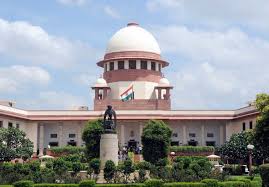NEW DELHI: Holding that legal services rendered by lawyers do not fall under the ambit of the Consumer Protection Act, the Supreme Court on Tuesday ruled that litigants cannot sue lawyers for “deficiency in service” to claim compensation.
“The legal profession is sui generis (unique in nature) and cannot be compared with any other profession. A service hired or availed of an advocate is a service under ‘a contract of personal service’, and therefore will fall within the exclusionary part of the definition of “service” contained in Section 2 (42) of the CP Act, 2019,” a Bench led by Justice Bela M Trivedi said, terming the advocates’ responsibility “onerous”.
The Bench said an advocate was the only link between the court and the client and was expected to follow his client’s instructions rather than substitute his (client’s) judgment.
“A complaint alleging ‘deficiency in service’ against advocates practising legal profession will not be maintainable under the CP Act,” it said, overruling a 1995 verdict of the National Consumer Disputes Redressal Commission (NCDRC) which held that lawyers were covered under the Act. The NCDRC order was stayed by the Supreme Court in 2009.
The Bench, however, clarified that lawyers can be sued in courts for negligence and misconduct.
“Undoubtedly, no professional — legal, medical or any other — enjoys any immunity from being sued or from being held liable for his professional or otherwise misconduct or other misdeeds causing legal, monetary or other injuries to his clients or the persons hiring or availing of his services. The fact that professionals are governed by their respective councils such as Bar councils or medical councils also will not absolve them of their civil or criminal liability arising out of their professional misconduct or negligence,” it said.
The top court said its 1995 verdict in the Indian Medical Association vs VP Shantha and others, bringing medical negligence under the Consumer Protection Act, should be reconsidered.
“…in our humble opinion, the said decision deserves to be revisited having regard to the history, object, purpose and the scheme of the CP Act and in view of the opinion expressed by us hereinabove to the effect that neither the ‘profession’ can be treated as ‘business’ or ‘trade’ nor the services provided by ‘professionals’ can be treated on a par with the services provided by businessmen or traders, so as to bring them within the purview of the CP Act,” the Bench said, requesting the CJI to send it to a larger Bench for reconsideration.
“We are therefore of the considered opinion that the very purpose and object of the CP Act, 1986, as re-enacted in 2019, was to provide protection to consumers from unfair trade practices and unethical business practices. There is nothing on record to suggest that the legislature ever intended to include professions or professionals within the purview of the Act,” said the Bench, which also included Justice Pankaj Mithal.
Justice Mithal, who delivered a separate concurring judgment, said “the legislature in India as in some other countries had not intended to include the services rendered by professionals, especially lawyers, to their client within the purview of the CP Act, 1986, and re-enacted in 2019.”
“One should also not lose sight of the fact that the other object of the Act was to provide consumers timely and effective administration and settlement of their disputes. If the services provided by all professionals are also brought within the purview of the Act, there will be a floodgate of litigations in commissions/forums established under the Act,” the Bench noted. Advocates were generally perceived to be their client’s agents and owed fiduciary duties to their clients who exercised direct control over their advocates rendering legal professional services, it said.


